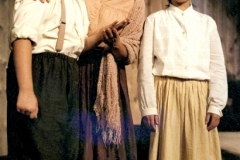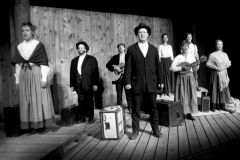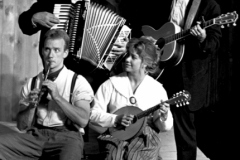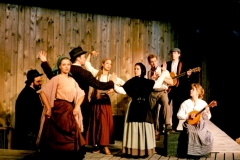Book and Lyrics by Fred Alley
Music by James Valcq
An Immigrant’s Journey to America
The Passage tells the story of the immigrants on whom this country is founded, the people who crossed in ships to Ellis Island to escape war and injustice elsewhere. With music by James Valcq and book and lyrics by AFT cofounder Fred Alley (creators of the Richard Rodgers Award-winning musical version of The Spitfire Grill), The Passage is a gripping, heartwarming tale of perseverance and hope. (4W, 5M) Produced in 1994.
Green Bay Press-Gazette
A Wisconsin Wonder
WARREN GERDS - July 1994
American Folklore Theatre continues to amuse and amaze
FISH CREEK – Evening is slipping on toward 8 o’clock, and it’s time for a summer ritual at Peninsula State Park. You’ve wound your way through the park’s tree-line [sic] roads, past Green Bay’s waters lapping on rocky shores, past knots of campers and maybe past deer grazing in a meadow.
You park your car in a grassy lot, then make your way up steps with logs as the front lip and grass in the middle. (Every once in a while, the stairs need cutting.)
On you stroll along a gravel, wood chip and dirt path to a wood hut. Behind this ticket office is an arc of wooden seats facing a wooden stage. The back wall is lined with knotty pine boards, while living pines and other trees tower behind and all about. You’re at American Folklore Theatre.
Already you’ve had an experience, and the evening’s just starting.
Out on stage come performers to put on another show in what has become a remarkable, 24-year tradition.
The company creates original musicals. Very folky. People-friendly. Earth-friendly. They teem with history, legend and lore. Fact or fiction, the folks in them are alive. They make you smile, or at least glow inside. This is something wonderful from Wisconsin.
You may have to slap a few mosquitoes or keep a wary eye on approaching rain clouds. But, performing outdoors, this theater company is a true breath of fresh air.
American Folklore Theatre’s two shows are put on alternating nights, except Mondays, throughout the summer.
Folks come, too. If this season runs true to course, about 20,000 people will see the offerings.
On one night is the quirky and fun Belgians in Heaven.
On the other is a little masterpiece, The Passage. It is tender, touching, and uplifting.
Despite the quaint setting, American Folklore Theatre is up to speed with cordless microphones that help you hear the often colorful singing.
Perhaps most impressive is the consistency of the material. The shows are neat packages, tied together well and filled with appealing songs and stories.
You feel a sense of commitment from the company. Chief instillers are artistic director/performer Jeffrey Herbst, writer/performer Fred Alley (co-creator of The Passage).
Now, you should know Belgians in Heaven is weird by most standards. A couple of brothers pop in and out of heaven almost at will. Still, it’s disarming.
It has comical scenes with a talking chicken (voicing provided by Lee Becker) along with an amiable tone.
At the core are bickering brothers. Leo (Alley) is a loafer who aspires to suck beer and gobble cheese curds. Roger (Heide) is driven to toil.
Roger also winds up in bizarre garb: A red union suit and a wispy women’s bed gown.
Belgians in Heaven is that kind of around-the-bend show. Yet it has a moral.
The Passage weaves together two stories of emigration—one from Russia, one from Ireland—to America.
The show covers a sweeping array of emotions. People are lonely or apprehensive. New love is found, and so is the new land. There’s rejoicing.
This is the saga of countless families. The Passage is a fairly universal show.
On the night I saw The Passage, its impact was palpable. The audience hung on every word and every note. Some songs are so powerful it would be a sin to applaud and break the mood, and this audience didn’t. It caught numerous subtleties and shifts. When the show was over, soul-satisfying enjoyment could be felt in the crowd.
Along with the sensitive songs (The Map on My Mind [sic], Somewhere in the Night, Shadows in the Moonlight, etc.) is the amazing Pull the Chain. About a first experience with a flushing toilet, it’s downright hilarious.
Beautiful voices abound—Alley and all the women roles (Suzette Nelson, Karen Mal, Amy Chaffee and Kathleen O’Regan).
This show could stand up on any stage. It is that special.
The Passage is patr one of a two-part tale. The Island, telling of experiences on Ellis Island, is being created for a future season.
I can hardly wait.
Door County Advocate
AFT’s “Passages” showcases varied talents of the cast
MIKE SHAW - July 1994
“Belgians in Heaven” is on its way to becoming the highest-grossing show in the American Folklore Theatre’s history. But the AFT’s other production of the 1994 summer season, “The Passage,” is more quietly setting a new high-water mark for quality.
“The Passage,” a musical tale of the European immigration to America, is the most complex, most ambitious, most substantial and most laudable project ever undertaken by the AFT. It is the second half of a perfectly balanced AFT season: “The Passage” will make you think and reflect as much as “Belgians” made you laugh and nod with recognition at people you know.
“Belgians in Heaven,” with its natural attraction for the Southern Door population and a title strange enough to bring the Scandinavians and toursists as well, is setting records at the box office. But if you’ve first discovered the AFT this summer through “Belgians,” make a return trip for “The Passage” to see how “Belgians” heroes Leo, Henry and Roger and their European neighbors got to America.
“Passage” reveals the painstaking research conducted last winter at Ellis Island by author Fred Alley (who also has two roles in the play) and composer James Valcq. The firsthand oral histories and anecdotes they read and heard at Ellis Island are weaved into the songs, storyline and narrations, adding authenticity to the fiction.
The story of how America’s melting pot started bubbling is larger than could be fully told by 11 actors on a small outdoor stage in Peninsula State Park. It is, after all, a story leading from the Mayflower to the present, of the grandparents and great-grandparents of the millions of us who trace our roots back to Europe.
But Alley’s script skillfully boils this universal tale down to two Everywomen representing both the Eastern European and Anglo-Saxon strains of 19th and 20th century immigration: Rifka (Suzette Nelson), a Polish Jew carrying an unborn passenger; and Claire (Karen Mal), whose Irish blarney has been tempered by the violent death of her lover Micho, an IRA-type revolutionary.
Both women seek to escape personal and political upheavals in the “land of milk and honey.” They and their boatmates know the trip will be trying, even miserable at times, and that the wonders of the New World have been exaggerated. Alley, in a credit to his research, portrarys the immigrants as hard-eyed realists instead of dreamy idealists and doesn’t downplay the difficult lot that awaited them. But they felt freedom and peace were worth the hardships, a sentiment eloquently expressed in a dream sequence by the ghost of Micho (Jeffrey Herbst), Claire’s dead lover.
The dream sequence is only one way the AFT cast cleverly keeps this massive history lesson from becoming top-heavy theater, a challenge that could have overwhelmed lesser talents. Letters to home, an impromptu dance on the ship’s deck and 18 original songs (the AFT folk musical tradition is alive and well) are designed to create a feeling instead of a lecture. They evoke the pains of bad food, seasickness and smelly, crowded quarters on the journey—a sunny day on the ocean (in the words of Claire, “all blue mist and water and I wish we could sail forever”).
Herbst took only a cameo role as the ghost so he could keep a handle on all the goings-on as director. He does an able job, efficiently moving 11 actors (some in dual roles) and making use of powerfulu choruses, duets and narrations. The ship dance takes advantage of the talents of local cast member Kathleen O’Regan, a formally trained dancer, and adds to the storyline by showing the immigrants boarded with hopeful spirit as well as cautious apprehension.
The show looks and feels like the AFT’s 1993 production “Northern Lights,” also directed by Herbst with bittersweet overtones. The comparison is appropriate because “The Passage” is meant to be the first part of a trilogy that concludes with “Northern Lights,” which told of the “stumpland” settlers who tried to farm in less than hospitable conditions. The second installment of this “work in progress,” tentatively called “The Island,” revolves around the immigrants’ arrival and stay at Ellis Island.
If “The Island” matches or surpasses the quality of “The Passage,” the AFT will have another thought-provoking winner in 1995. But even if it doesn’t, “The Passage” seals AFT’s transition from folk singers in the park (its predecessor, the Heritage Ensemble) to a first-class musical theater boasting solid, established veterans (Alley, Herbst and Fred “Doc” Heide) augmented by fine New York talent (Mal and, this year, Nelson and Amy Chaffee).
The word is the AFT may take “The Passage” out of the Peninsula Park amphitheatre and go on the road. If so, the show’s easily good enough to flourish outside the woods.
(“The Passage” plays Tuesday, Thursday and Saturday nights at 8 while “Belgians in Heaven” takes the stage Mondays, Wednesdays and Fridays at the same time. The current season runs through Aug. 27. Allow 15 minutes to drive from the Peninsula Park entrance to the amphitheatre).





